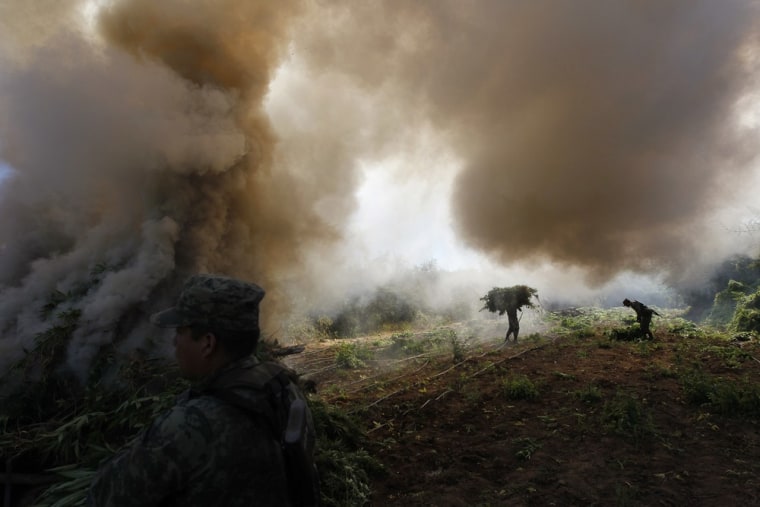The global war on drugs has failed and governments should explore legalizing marijuana and other controlled substances, according to a commission that includes former heads of state, a former U.N. secretary-general and a business mogul.
A new report by the Global Commission on Drug Policy argues that the decades-old worldwide "war on drugs has failed, with devastating consequences for individuals and societies around the world." The 24-page paper was released Thursday.
"Political leaders and public figures should have the courage to articulate publicly what many of them acknowledge privately: that the evidence overwhelmingly demonstrates that repressive strategies will not solve the drug problem, and that the war on drugs has not, and cannot, be won," the report said.
The 19-member commission includes former U.N. Secretary-General Kofi Annan and former U.S. official George P. Schultz, who held cabinet posts under U.S. Presidents Ronald Reagan and Richard Nixon.
Others include former U.S. Federal Reserve chairman Paul Volcker, former presidents of Mexico, Brazil and Colombia, writers Carlos Fuentes and Mario Vargas Llosa, U.K. business mogul Richard Branson and the current prime minister of Greece.
A former British ambassador to Colombia during Cesar Gaviria's presidency (1990-1994) and a longtime advocate of the legal regulation of drugs told msnbc.com that policy makers should come to terms with the enormous toll the war on drugs was having around the world.
"The United States should look at the extraordinary costs that the policies it has pursued have brought about," said Sir Keith Morris, who is on the advisory board of the International Council on Security and Development, a think tank that seeks to reform drug policies.
"It should look at the huge costs of incarcerating large number of people, the damage it's done ... (and) the extraordinary situation with armed conflicts and militant groups — financed by consumption in the U.S. and U.K. — killing British and American troops."
Instead of punishing users who the report says "do no harm to others," the commission argues that governments should end criminalization of drug use, experiment with legal models that would undermine organized crime syndicates and offer health and treatment services for drug-users in need.
"Vast expenditures on criminalization and repressive measures directed at producers, traffickers and consumers of illegal drugs have clearly failed to effectively curtail supply or consumption," the report added. "Apparent victories in eliminating one source or trafficking organization are negated almost instantly by the emergence of other sources and traffickers."
The commission called for drug policies based on methods empirically proven to reduce crime, lead to better health and promote economic and social development.
"Arresting and incarcerating tens of millions of these people in recent decades has filled prisons and destroyed lives and families without reducing the availability of illicit drugs or the power of criminal organizations," the report said. "There appears to be almost no limit to the number of people willing to engage in such activities to better their lives, provide for their families, or otherwise escape poverty. Drug control resources are better directed elsewhere."
'Alternatives'
The commission is especially critical of the United States, saying it must change its anti-drug policies from being guided by anti-crime approaches to ones rooted in healthcare and human rights.
"We hope this country (the U.S.) at least starts to think there are alternatives," former Colombian president Gaviria told The Associated Press by phone. "We don't see the U.S. evolving in a way that is compatible with our (countries') long-term interests."
The office of White House drug czar Gil Kerlikowske said the report was misguided.
"Drug addiction is a disease that can be successfully prevented and treated. Making drugs more available — as this report suggests — will make it harder to keep our communities healthy and safe," Office of National Drug Control Policy spokesman Rafael Lemaitre said.
That office cites statistics showing declines in U.S. drug use compared to 30 years ago, along with a more recent 46 percent drop in current cocaine use among young adults over the last five years.
The report cited U.N. estimates that opiate use increased 34.5 percent worldwide and cocaine 27 percent from 1998 to 2008, while the use of cannabis, or marijuana, was up 8.5 percent.
Meanwhile, reported that Southeast Asia's so-called Golden Triangle narcotics zone "has reinvented itself — and is more dangerous than ever."
It said that poppy cultivation in Burma increased 76 percent last year to about 639 tons. Cultivation has also grown in Thailand and Laos, the magazine reported.
"We are worried about the prospects of further expansion in 2011," Gary Lewis, East Asia and Pacific representative for the U.N. Office on Drugs and Crime, told TIME. "The international community has taken its eye off the ball on drug production and trafficking in Southeast Asia."
